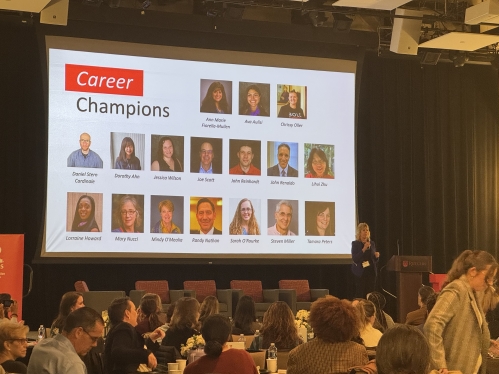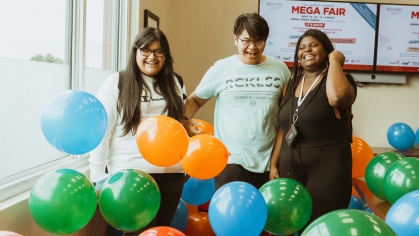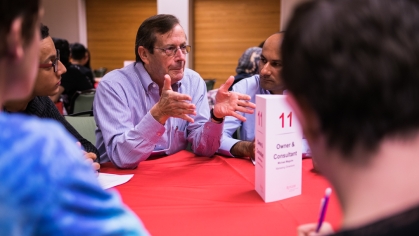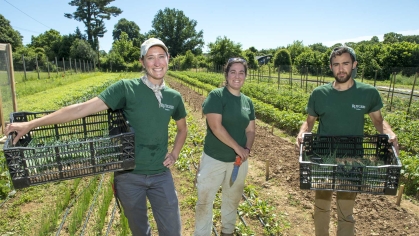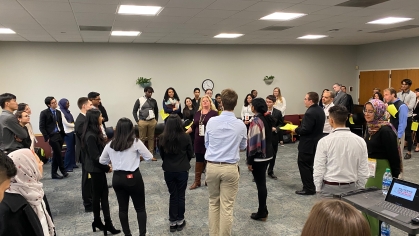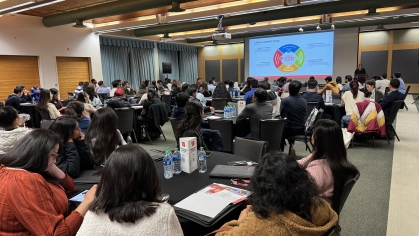A Career Ready Campus: Roadmap 2030
Career Exploration and Success — Strategic Plan
Together, we are building a Career Ready Campus
Career readiness is not optional—it must be woven into every Rutgers student’s experience. While not all students can take part in optional activities or unpaid opportunities, every student deserves access to career readiness. A Career Ready Campus: Roadmap 2030 outlines how Career Exploration and Success (CES), in partnership with the campus community, will help students build the confidence, competencies, and connections to thrive beyond graduation. More than a plan, it is a call to action—uniting faculty, staff, employers, and students to ensure every Rutgers graduate leaves fully prepared for their future.
Pillar 1: Provide Self-Discovery Resources
Self-discovery is the foundation of a Career Ready Campus. By helping students understand their strengths, interests, and values early, we ensure career readiness is not a separate activity, but an embedded part of the Rutgers experience. This chapter focuses on making self-discovery accessible to every student through intentional programs, partnerships, and tools.
Goal 1.1: Enhance Student Engagement in Self-Discovery:
We will expand outreach so students connect with career resources from their first days on campus. Initiatives include a “How Do I Even Get Started?” workshop, collaborations with New Student Orientation to activate Handshake early, and Discover You—a new one-day signature event developed with advisory boards and campus partners that engages students in interactive self-discovery activities. We will also research best practices from peer institutions, such as the University of Iowa’s campus partner training program, to strengthen our own initiatives and ensure Rutgers remains at the forefront of embedding self-discovery across the campus.
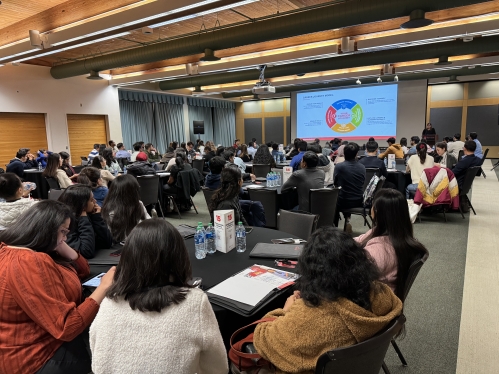
Goal 1.2: Increase Self-Discovery through First-Year Interest Group Seminars (FIGS):
FIGS introduces first-year students to career exploration in the classroom. We will refine its curriculum, expand enrollment, and build strategies to sustain engagement after the course ends. Partnering with instructors ensures career readiness concepts are embedded into students’ first-year experience.
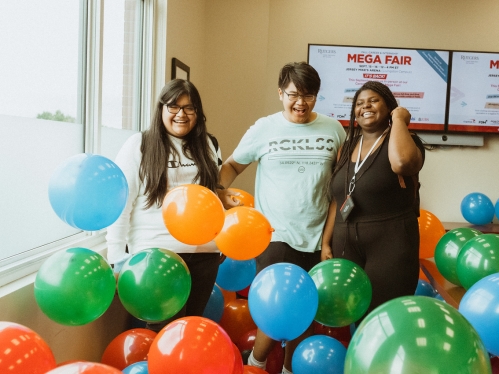
Goal 1.3: Strengthen Partnerships to Support Self-Discovery:
Advisors, instructors, and student services will be key partners in embedding self-discovery into academic and advising spaces. We will explore opportunities in first-year courses such as the Honors College Forum and Engineering Transition Course, and expand involvement in major/minor exploration events. These collaborations bring readiness messages to where students already are.
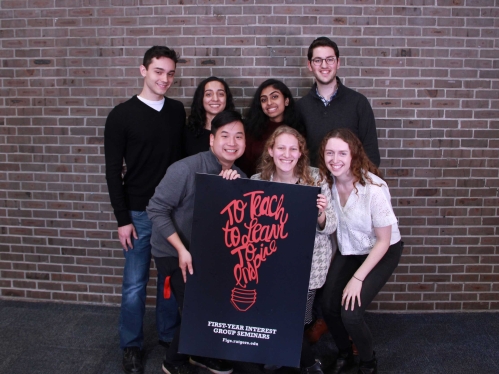
Goal 1.4: Develop and Utilize Effective Self-Discovery Tools:
Students will have access to modern assessments and programs at every stage of their journey. Plans include expanding use of Traitify, offering Strong Interest Inventory for graduate students, and engaging advisory boards to support undecided students. These tools ensure career exploration is within reach for all.
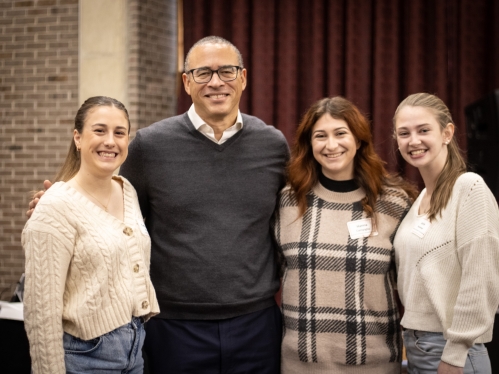




Pillar 2: Explore Careers and Academic Pathways
Exploring careers and academic pathways is central to a Career Ready Campus. This chapter emphasizes connecting academic choices with career outcomes through events, mentoring, and resources that make exploration an embedded, equitable experience. By offering both in-person and virtual options, students can explore pathways in ways that fit their needs.
Goal 2.1: Enhance In-Person Career Exploration Opportunities
We will expand programs that bring students together with alumni, employers, and peers. Efforts include working with the Rutgers University Alumni Association on mentoring pipelines, refreshing Career Exploration Nights, and piloting career treks when feasible. Partnerships with transfer and first-year programs will embed exploration into multiple student entry points.
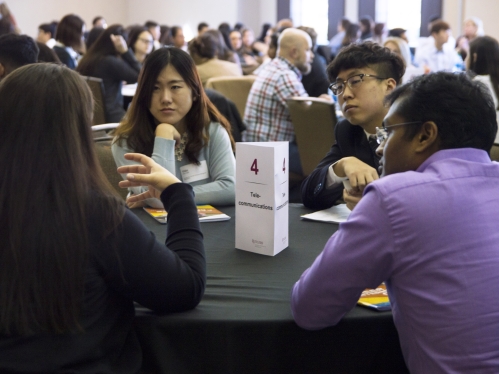
Goal 2.2: Develop and Enhance Virtual Asynchronous Opportunities
Students need flexible ways to explore careers beyond traditional events. We will revamp major-specific handouts, expand digital tools linking academics to outcomes, and strengthen social media content. Collaborating with initiatives like Career Discovery Advantage ensures resources are tied to curricular planning.

Goal 2.3: Expand Access to Career Mentorship through the Scarlet Career Mentoring Initiative
Mentorship helps students turn exploration into readiness. CES will expand flash mentoring in Student-Alumni Career Connect (SACC), grow the Intern for a Day program, and pilot semester-long externships. In addition, CES will build a community of practice that unites faculty, staff, alumni, and students to share strategies for mentoring and develop new ways to expand meaningful opportunities for students.
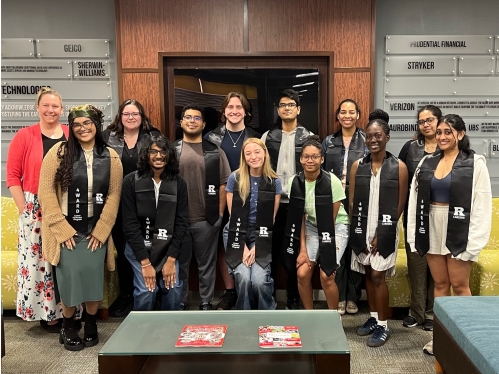



Pillar 3: Develop Professional Competencies and Skills
Developing professional competencies and skills is at the heart of a Career Ready Campus. This chapter focuses on the National Association of Colleges and Employers (NACE) Career Readiness Competencies—such as communication, teamwork, and professionalism—and how they will be embedded into coursework, student employment, and experiential learning. These efforts ensure every student graduates with skills that prepare them for success in work, graduate school, and life.
Goal 3.1: Develop a Culture of Career Readiness Across Campus
We will engage faculty, staff, and partners in making competencies a shared focus. Initiatives include launching the Faculty Career Fellows Program, piloting reflective workshops with the Division of Undergraduate Education, and building “unpacking” activities into experiential programs. We will also highlight academic courses within each school that align with the NACE Career Readiness Competencies, supported by a Drupal-powered resource where partners can submit and update listings. These courses will be marketed each year to students through Rutgers Handshake to emphasize the connection between coursework and career readiness. A new Career Readiness in Experiential Learning Guidebook will also be created for faculty, advisors, and co-curricular program leaders, paired with an asynchronous training and a LinkedIn badge for participants who complete it.
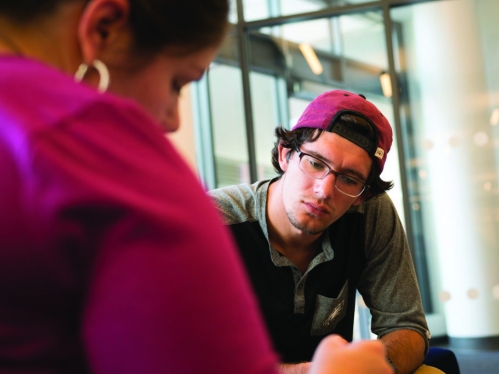
Goal 3.2: Expand High-Impact Student Employment Opportunities
Student employment will be elevated as a career readiness pathway. The Student Employment Enrichment (SEE) Program will provide reflection activities, supervisor training, and recognition opportunities in partnership with campus departments. Skills labs with campus experts and a new on-campus job fair will further connect employment with competency development.
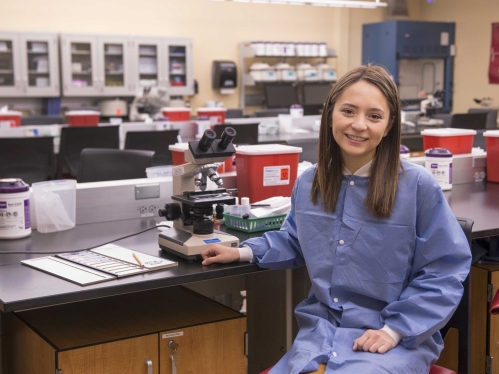
Goal 3.3: Expand and Advance Internship Opportunities and Best Practices
Internships will be strengthened as core readiness experiences. CES will expand the Rutgers Internship & Co-op Program, enhance the Scarlet Service Internship (RSSI) Program, and partner with academic units to build a campus-wide internship ecosystem. Tools like the Handshake Experiences Module will help embed skill development, and a Drupal-powered internship course database will allow partners to submit offerings and receive automated alerts to keep listings current. Experience data will be synchronized with the CES 46 Administrative System to award stamps in the #RUTGERSWORKS Free Tuition Challenge, giving students a direct incentive to participate in and complete internship experiences.
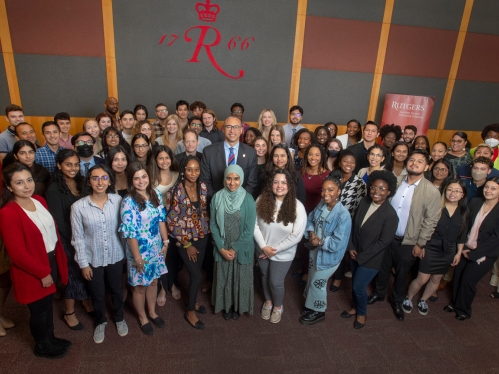



Pillar 4: Pursue Post-Graduation Goals
Helping students achieve meaningful post-graduation outcomes is a defining measure of a Career Ready Campus. This chapter outlines how CES, together with academic departments, advisors, employers, and student-serving offices, will prepare students for employment, graduate school, service, and other pursuits. By embedding career readiness into curricula, advising, and co-curricular programs, we ensure it is not optional, but a shared and equitable part of every Rutgers student’s transition beyond graduation.
Goal 4.1: Increase Career Advising Capacity
We will expand advising by working with campus partners and employers to provide more one-on-one and small-group guidance. Key efforts include launching the Industry Consultant Program, where employer representatives meet with students for targeted advice, and growing the Peer Career Educator (PCE) Program so each Career Community has peer support. These initiatives ensure advising capacity is scaled through collaboration, making guidance more accessible across disciplines.
Goal 4.2: Enhance and Optimize the Career Interest Community Model
Career Interest Communities connect students with tailored resources, networks, and opportunities. We will refine their structure, strengthen professional development for CES staff, and collaborate with advisory boards, faculty, and student groups to keep programming relevant. By embedding career support directly into these communities, students can link their academic and career goals in a more seamless way.
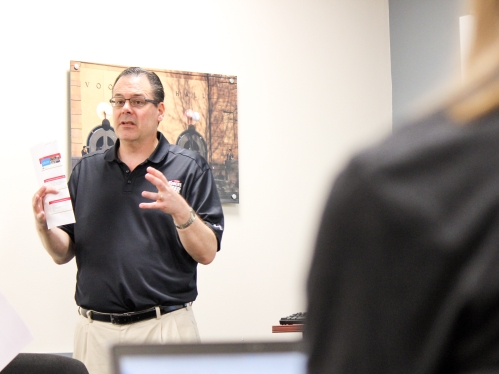
Goal 4.3: Increase Students' Awareness of Resources for Furthering Education
Many students pursue graduate or professional school, and support for these pathways must be shared. CES will partner with academic departments, faculty advisors, and graduate admissions offices to co-develop resources and programs, from test prep to funding navigation. By embedding graduate preparation into advising and departmental guidance, readiness for advanced education becomes a visible and supported option across campus.
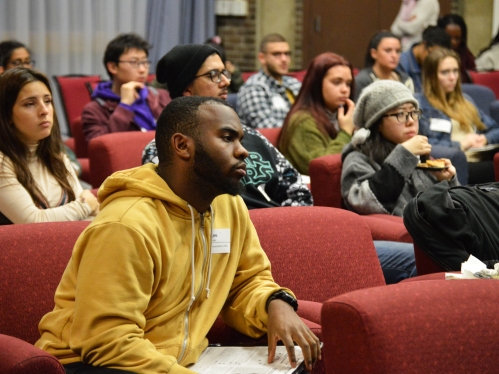
Goal 4.4: Increase Students' Awareness of Resources for Employment and Gap Year Options
Students pursuing employment or service experiences need tailored preparation. CES will improve job-search resources, provide training for navigating a shifting job market, and expand preparation events in collaboration with student affairs and academic units. As part of this effort, CES will launch a Drupal-powered database of career management courses across Rutgers. The system will allow partners to submit courses and receive automated reminders to keep information up to date, giving students access to a comprehensive, reliable list of offerings that build career management skills.

Goal 4.5: Prepare Students for the Transition from College Student to New Professional
The transition from student to professional requires both confidence and practical readiness. CES will prepare students through workshops on workplace expectations, professional identity, and life design skills, while embedding financial literacy into senior-year courses and advising in collaboration with the Financial Literacy Team in Enrollment Management.
To expand access, CES will partner with student organizations through initiatives such as the annual Student Organization Reception & Employer Networking Dinner (SOREND), a new Sponsorship Fund to co-support major career events, and exploring a Student Organization Career Readiness Summit in partnership with Student Centers and Activities. CES will also meet requests for tailored workshops, with trained CES student colleagues helping to deliver sessions at scale.
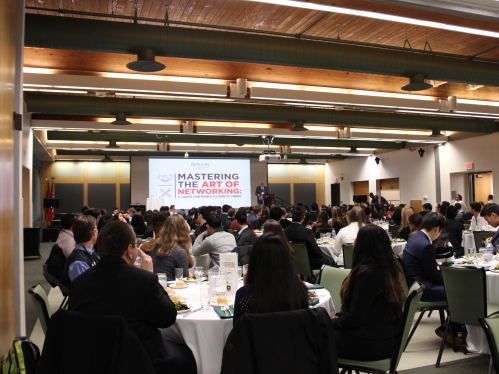
Goal 4.6: Develop Opportunities for Employers to Connect with Candidates
Employers are essential partners in students’ post-graduation success. CES will diversify the employer base, strengthen the Knights of the Round Table (KoRT) Partners Program, and build “Portfolio Employer” groups within Career Interest Communities. We will also support academic units and student-serving offices in connecting employers with coursework, experiential learning, and research initiatives. Signature efforts include Industry Connect Events, which provide intimate, community-focused recruiting experiences, and the CES Career Catalyst Case Study Competition, where interdisciplinary student teams—working alongside faculty and employers—develop solutions to real-world recruitment challenges and present them at the RecruitEd Summit, with a People’s Choice award extending engagement to the broader community.
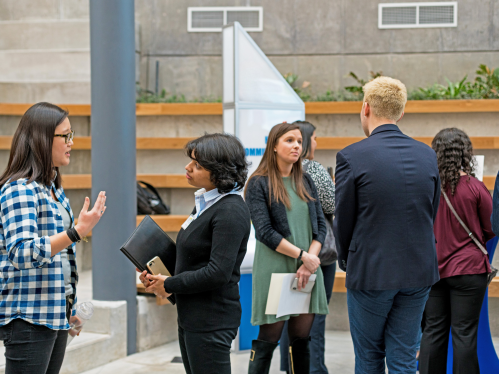





Pillar 5: Building a Career-Ready Campus Together
A Career-Ready Campus is built through shared commitment and collaboration across Rutgers. Many of the partnerships that make this possible are already reflected throughout this Roadmap—in the self-discovery initiatives that engage advisors and instructors, the exploration and mentoring programs that connect alumni and employers, the competency-building efforts that unite faculty and student employment leaders, and the post-graduation supports developed with academic departments and student organizations. This final chapter brings those elements together to strengthen the Career Ecosystem that links Career Exploration and Success (CES) with partners across Academic Affairs, Student Affairs, and Enrollment Management. By investing in shared data, training, and communication systems, Rutgers–New Brunswick will continue building a unified Career-Ready Campus where every unit contributes to equitable access, measurable impact, and strong post-graduation outcomes for all students.
Goal 5.1 – Strengthen Shared Training and Capacity for Career Readiness
We will expand professional development and shared learning across Rutgers to build collective capacity for embedding career readiness into teaching, advising, and programs. Joint trainings, shared learning objectives, and resources on the NACE Career Readiness Competencies and Career Journey Model will equip faculty, advisors, and supervisors as co-educators so that readiness is consistently integrated across the campus.
Goal 5.2 – Expand and Strengthen the Career Ecosystem Across Campus Partners
We will deepen collaboration with academic units, student-serving offices, and employer partners through aligned goals, shared dashboards, and coordinated engagement strategies. A connected Career Ecosystem—supported by data sharing, regular partner meetings, and recognition programs—will help all units see how their work contributes to student success and Rutgers’ career outcomes goals.
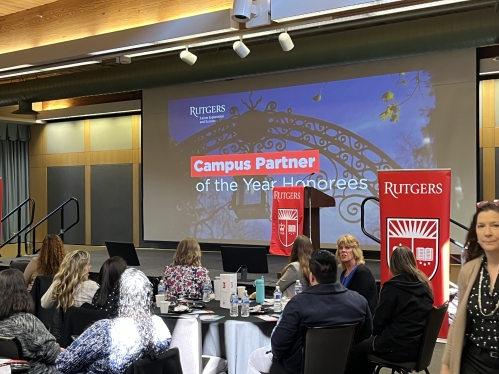
Goal 5.3 – Advance Equitable Access to Career Resources and Experiences
Together with schools, student organizations, cultural centers, and employers, CES will co-create initiatives that remove barriers and expand opportunity. Efforts such as the Career Closet, graduate-student support, and Career Portrait Lounges will ensure readiness resources and experiences are accessible, inclusive, and visible as shared campus assets.
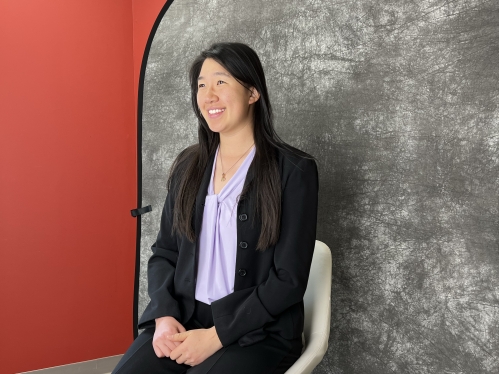
Goal 5.4 – Enhance and Align Shared Career Readiness Resources Across the Ecosystem
CES will collaborate with faculty, advisors, and partner offices to assess and enhance shared career tools, data systems, and educational content. New centralized repositories of presentations, lesson plans, and curriculum materials—organized around the Career Journey Model and NACE Competencies—will help partners embed consistent messaging and measure collective impact.
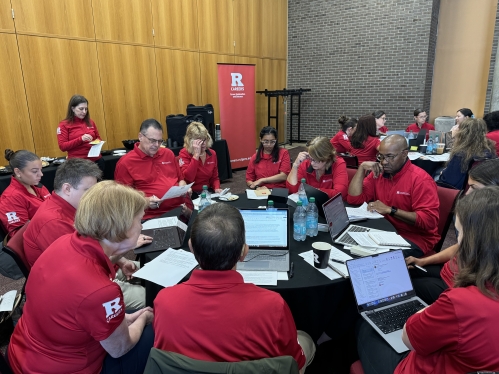
Goal 5.5 – Equip Students for Successful Post-Graduation Outcomes Through Collective Action
We will collaborate with faculty, advisors, and student-affairs partners to embed Career Journey Guides and roadmaps into courses, Canvas sites, and advising tools. Shared dashboards and outcomes data will allow units to evaluate how their programs contribute to student success, while expanded #RUTGERSWORKS initiatives will highlight campus-wide participation in advancing career readiness.
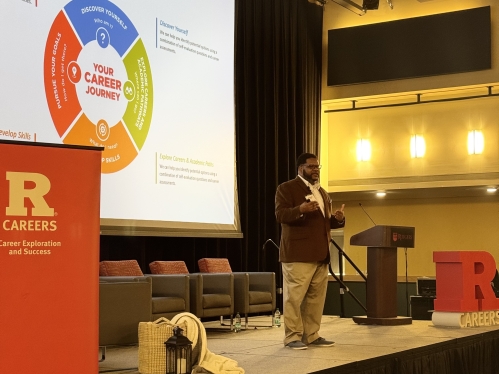
Goal 5.6 – Coordinate and Celebrate Progress Toward a Career-Ready Campus
Rutgers will track and showcase collective progress through an annual Career-Ready Campus Progress Report and a public Career Ecosystem Website featuring best practices and data dashboards. CES will also expand recognition programs—including student-nominated Career Champions and new Campus Partner of the Year awards—to celebrate the shared commitment that drives our Career-Ready Campus vision.
